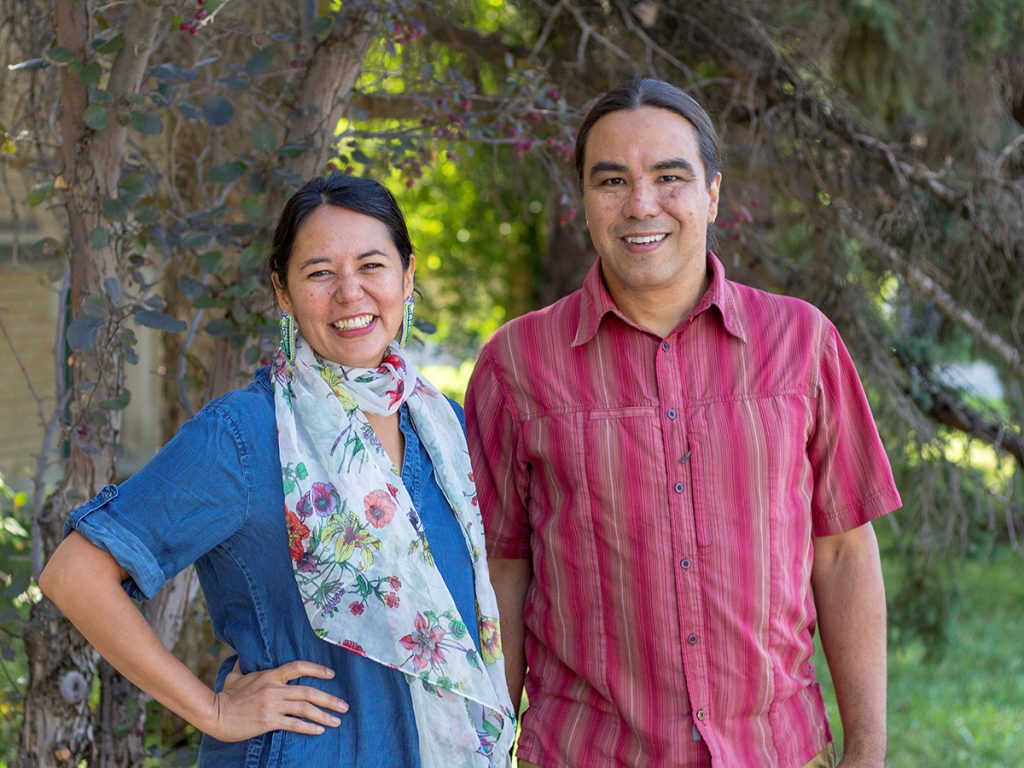
The UW Department of Health Systems and Population Health (HSPop) is excited to introduce two new faculty members — Michelle Johnson-Jennings and Derek Jennings. They came to UW this summer from the University of Saskatchewan in Saskatoon, in the Saskatchewan province of Canada.
Michelle Johnson-Jennings (enrolled member of the Choctaw Nation) is a joint professor with the department and her primary location, the UW School of Social Work. She is the first Environmental and Land-based Healing Director at the Indigenous Wellness Research Institute. She serves as an Indigenous clinical health psychologist who specializes in developing culturally-appropriate land-based health interventions.
During her career at the University of Saskatchewan, she served as the Canada research chair in Indigenous Community-engaged Research. She was also the scientific director for the Waniska Centre for HIV, Hepatitis C Virus, and sexually transmitted blood-borne illness. Her research methods include community-based participatory research, and her research focus is health promotion for Indigenous populations.
Derek Jennings (Quapaw Nation, Dehiga Sioux and Sac & Fox, Anishinaabe) is a Bezruchka Family Endowed Professor within the UW School of Public Health and assistant professor in HSPop. At the University of Saskatchewan, Jennings served as an assistant professor with Community Health and Epidemiology in Medicine. He was also the community outreach director for the Waniska Centre for HIV, Hepatitis C Virus, and sexually transmitted blood-borne illness.
His research areas include healthy eating and land practices among Indigenous populations in order to reduce obesity and diabetes. His research methods are qualitative, including photovoice and image-based methodologies, in which community members represent themselves, tell their own story, and support social change through photography.
They share about their decisions to come to UW and what they are looking forward to in their work here.
What drew you to your work in health promotion?
Johnson-Jennings: Being a first-generation college student, with meager socioeconomic means, I experienced low healthcare access and high health disparities within my family and my community. Nonetheless, I was surrounded by those advocating for social justice and change. Hence, as a young child, I sought to partner with my community and other Indigenous groups to improve well-being and disrupt racial stereotypes and biases.
Jennings: While working as a freelance photographer (and owner of a small graphic design business), I produced health promotional brochures, posters and other materials for national campaigns for various organizations and nonprofits. While I was working on my master’s degree at this time, I saw the impact of these image-based items on health and decisions to make behavioral changes. At this point, I decided that I wanted to pursue my doctorate in image-based research and community-engaged research methods. At the University of Wisconsin department of Family Medicine, I further collaborated with Dr. Alex Adams to focus on lowering obesity among Indigenous children. After building a relationship with her research team, I was awarded a Robert Wood Johnson predoctoral fellowship. Being an Indigenous person, I have always been interested in Indigenous families’ health and in tribal food practices. Hence, upon graduation, my passions and commitment to addressing Indigenous community health only grew.
What are you most looking forward to in your work at UW?
Johnson-Jennings: I am looking forward to building Environmental and Land-based Healing curriculum and research at UW. As a clinical health psychologist, I have been trained to approach health and well-being through a western framework; while at the same time, I have been guided by my Indigenous ancestral teachings around health and have continued to work with communities in elevating these approaches. While at UW, I seek to partner with Indigenous communities in centering the ongoing strengths of Indigenous knowledges and grounding health interventions in such. Through refocusing healing as connected to land and environment, we can actively disrupt colonial systems of oppression by promoting indigenization of research and healing practices.
Jennings: I am most looking forward to building relationships with tribal partners to learn about and support their research needs, as well as learning from my new colleagues at UW. I hope to keep building and creating new Indigenous knowledge around health and well-being, while supporting Indigenous communities at the UW and in the Pacific Northwest. UW seems to be a supportive and exciting place to conduct such work.
What are your interests and hobbies outside of the office?
Johnson-Jennings: Outside of the office, I really enjoy trail running, hiking, and being in nature, which all evoke mindfulness for me. I find it centers me and helps me in my daily routine. I also enjoy beadwork, watching my kids powwow dance, and learning from the land by gardening and harvesting.
Jennings: I enjoy watching my children grow and learn to be the special people whom they are. I also spend many hours outside connecting with the so-called natural world while interacting with animals and plants that nourish our lives and beings. I further enjoy taking walks with my dogs as I relax and enjoy the outdoors.